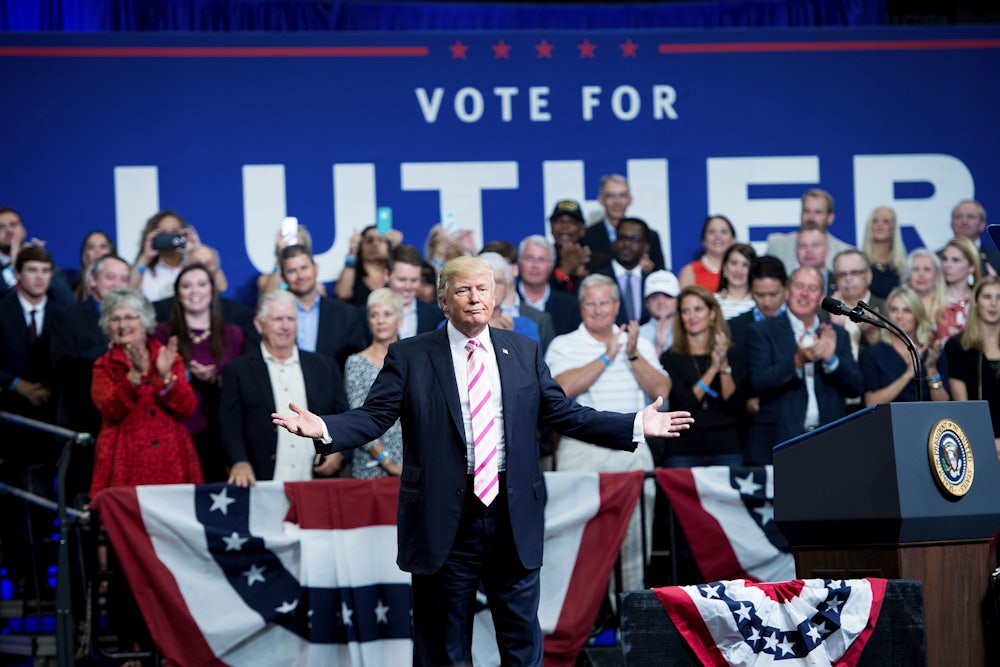Donald Trump is at home on the cultural battlefield, as shown by his legendary feuds with everyone from Rosie O’Donnell to Alec Baldwin to Meryl Streep. The more sober members of the press treat Trump’s cultural wars as a diversion, perhaps intentionally, from his political failures. Yet it is hard to ignore how central cultural strife is to Trump’s presidency after his latest incitement, attacking Colin Kaepernick and other football players who have kneeled during the national anthem to protest police brutality. At a rally in Alabama on Friday—ostensibly to support Senator Luther Strange, who nonetheless lost in Tuesday’s special election—Trump’s most passionate moment came when he fantasized about punishing politically outspoken football players: “Wouldn’t you love to see one of these NFL owners, when somebody disrespects our flag, to say, ‘Get that son of a bitch off the field right now. Out! He’s fired. He’s fired!’”
Trump is a strenuous cultural warrior, but it’s not always obvious what he hopes to achieve with the fights he picks. He clearly gets a rush from riling up his supporters, both in person and online. According to a report from Glenn Thrush and Maggie Haberman in The New York Times, the football tirade was “the one part of the trip that cheered him up” and he especially enjoyed the “rallygoers’ thunderous approval of his attack on Colin Kaepernick.” By their account, Trump isn’t just seeking an ego boost, but strategically is solidifying his bond with his most passionate fans:
In private, the president and his top aides freely admit that he is engaged in a culture war on behalf of his white, working-class base, a New York billionaire waging war against “politically correct” coastal elites on behalf of his supporters in the South and in the Midwest. He believes the war was foisted upon him by former President Barack Obama and other Democrats — and he is determined to win, current and former aides said.
This account only seems partially accurate. It defies belief that the culture wars were “foisted” on Trump, since he’s been eagerly engaging in them for decades in various forms, going back at least to 1989 when he took out a full page ad in the Times calling for the execution of the Central Park Five (a group of non-white teens who were accused of a brutal rape, which they were later exonerated of).
Moreover, it’s not at all clear that Trump is “determined to win” the culture war. In politics, victory usually involves some element of persuasion—convincing skeptics and even opponents to accept, even if reluctantly, your point. Trump isn’t pursuing victory of that sort. Rather, he’s simply ensuring that both sides become even more firmly entrenched in their prior positions. He launched his anti-kneeling cause at a partisan rally of overwhelmingly white Southerners. It’s hard to imagine a venue better suited to the racial subtext of his stance—and thus, equally well suited to ignite a backlash, which Trump got. By Sunday, dozens of players were taking the knee, with many more registering more moderate forms of protests of locking arms.
If the goal was to stop players from taking the knee, Trump failed. If the goal was to hijack Kaepernick’s protest against police brutality and turn it into another Trumpian carnival with himself as both ringmaster and star of the show, then the president succeeded.
Times columnist Ross Douthat makes a useful distinction between good and bad cultural wars. “A good culture war is one that, beneath all the posturing and demagogy and noise, has clear policy implications, a core legal or moral question, a place where one side can win a necessary victory or where a new consensus can be hashed out,” Douthat argued. “A bad culture war is one in which attitudinizing, tribalism and worst-case fearmongering float around unmoored from any specific legal question, in which mutual misunderstanding reigns and a thousand grievances are stirred up without a single issue being clarified or potentially resolved. Unfortunately for us all Donald Trump is a master, a virtuoso, of the second kind of culture war—and a master, too, of taking social and cultural debates that could be important and necessary and making them stupider and emptier and all about himself.”
But Trump isn’t likely to stop doing it; he doesn’t have many other arrows in his political quiver. Working with the Republicans has become a chore, since they can’t get anything done. He has so little regard for the GOP that he childishly mocks senators Mitch McConnell and John McCain in private. Roy Moore’s triumph over Strange in the Alabama primary this week shows that Trump’s power is limited even among his own followers. Foreign policy is proving too complicated, so he’s delegating decision-making to the military and the former generals working for him. The ideological foot soldiers of Trumpism, notably Steve Bannon and Sebastian Gorka, have been forced out of the White House. And Trump’s protectionist agenda has been derailed, with trade hawk Peter Navarro now in the humiliating position of serving under free-trader Gary Cohn. Day by day, Trump is losing power.
Trump, largely because he has no interest or experience in governing, is being boxed in by the Washington establishment he hates so much. But he is more than capable of waging culture wars; indeed, it’s one of the few things at which he’s genuinely expert. It doesn’t matter to him that his culture wars won’t deliver policy victories. The fight is the means and the end. As Alfred Pennyworth tells Batman in The Dark Knight, “Some men just want to watch the world burn.” The president of the United States is one of them.
